Related Research Articles

The Byrds were an American rock band formed in Los Angeles, California, in 1964. The band underwent multiple lineup changes throughout its existence, with frontman Roger McGuinn remaining the sole consistent member. Although their time as one of the most popular groups in the world only lasted for a short period in the mid-1960s, the Byrds are considered by critics to be among the most influential rock acts of their era. Their signature blend of clear harmony singing and McGuinn's jangly 12-string Rickenbacker guitar was "absorbed into the vocabulary of rock" and has continued to be influential.

Jackson Browne is the debut album of American singer Jackson Browne, released in 1972. It peaked on the Billboard 200 chart at number 53. Two singles were released with "Doctor, My Eyes", which peaked at number 8 on the Pop Singles chart, and "Rock Me on the Water", which reached number 48.
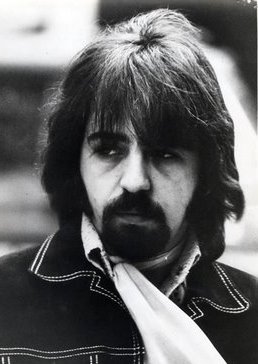
Clarence White was an American bluegrass and country guitarist and singer. He is best known as a member of the bluegrass ensemble the Kentucky Colonels and the rock band the Byrds, as well as for being a pioneer of the musical genre of country rock during the late 1960s. White also worked extensively as a session musician, appearing on recordings by the Everly Brothers, Joe Cocker, Ricky Nelson, Pat Boone, the Monkees, Randy Newman, Gene Clark, Linda Ronstadt, Arlo Guthrie, and Jackson Browne among others.

Ballad of Easy Rider is the eighth album by the American rock band the Byrds and was released in November 1969 on Columbia Records. The album was named after the song "Ballad of Easy Rider", which had been written by the Byrds' guitarist and singer, Roger McGuinn, as the theme song for the 1969 film, Easy Rider. The title was also chosen in an attempt to capitalize on the commercial success of the film, although the majority of the music on the album had no connection with it. Nonetheless, the association with Easy Rider heightened the Byrds' public profile and resulted in Ballad of Easy Rider becoming the band's highest charting album for two years in the U.S.
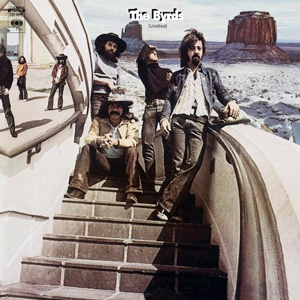
(Untitled) is the ninth album by the American rock band the Byrds and was released in September 1970 on Columbia Records. It is a double album, with the first LP featuring live concert recordings from early 1970, and a second disc consisting of new studio recordings. The album represented the first official release of any live recordings by the band, as well as the first appearance on a Byrds' record of new recruit Skip Battin, who had replaced the band's previous bass player, John York, in late 1969.
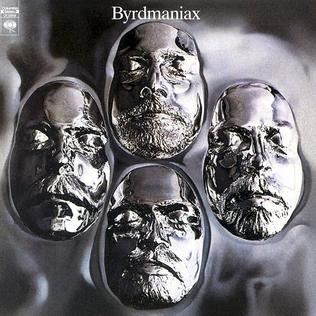
Byrdmaniax is the tenth studio album by the American rock band the Byrds. It was released in June 1971 on Columbia Records at a time of renewed commercial and critical success for the band, due to the positive reception that their two previous albums, Ballad of Easy Rider and (Untitled), had received. The album was the second by the Byrds to feature the Roger McGuinn, Clarence White, Gene Parsons, and Skip Battin line-up of the band and was mostly recorded in early 1971, while the band were in the midst of an exhausting tour schedule. As a result, the band had little time to hone their new songs before recording commenced and thus, much of the material on the album is underdeveloped. Byrdmaniax was poorly received upon release, particularly in the United States, and did much to undermine the Byrds' new-found popularity.

Farther Along is the eleventh studio album by the American rock band the Byrds and was released in November 1971 on Columbia Records. For the most part, the album was recorded and produced by the Byrds themselves in London, England, over the course of five work-intensive days in July 1971. It was quickly released as a reaction to the commercial failure of the Byrds' previous album, Byrdmaniax, and as an attempt to stem the criticism that album was receiving in the music press.
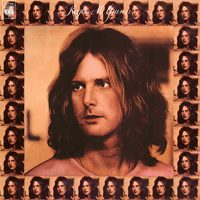
Roger McGuinn is the first full-length solo album by Roger McGuinn, released in 1973.

"Take It Easy" is the debut single by the American rock band Eagles, written by Jackson Browne and Eagles band member Glenn Frey, who also provides lead vocals. It was released on May 1, 1972, and peaked at No. 12 on the Billboard Hot 100 chart on July 22, 1972. It was also the opening track of the band's eponymous debut album and has become one of their signature songs, included on all of their live and compilation albums. It is listed as one of The Rock and Roll Hall of Fame's 500 Songs that Shaped Rock and Roll.

"Doctor, My Eyes" is a 1972 song written and performed by Jackson Browne and included on his debut album Jackson Browne. Featuring a combination of an upbeat piano riff coupled with lyrics about feeling world-weary, the song was a surprise hit, reaching number 8 on the Billboard Hot 100 in spring 1972, after debuting on the chart at number 80. Browne would not see the chart's Top 10 again until 1982's soundtrack hit "Somebody's Baby", although "Running on Empty" just missed the Top 10, reaching number 11. Billboard ranked "Doctor My Eyes" as the No. 92 song for 1972. In Canada, the song peaked at number four.
"Full Circle Song" is a country rock-style song written by Gene Clark. For the lyrics, he used an allegorical wheel of fortune motif to comment on the unpredictable nature of fame and fortune. Recorded in Los Angeles in 1972, the song was originally released on Clark's Roadmaster, which was only issued in the Netherlands in January 1973.
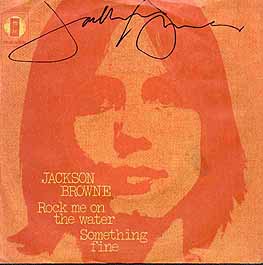
"Rock Me on the Water" is a song written and performed by American singer-songwriter Jackson Browne, released as the second single from his 1972 debut album, Jackson Browne, following the No. 7 success of Browne's debut single, "Doctor, My Eyes". Browne's version reached No. 48 on Billboard's September 23, 1972, Hot 100 chart, spending nine weeks on that chart after debuting at No. 73 on August 5, 1972. It was also released as a single in Canada, Germany and Japan, and as a promotional single in the United Kingdom.

"Fountain of Sorrow" is a song written and performed by American singer-songwriter Jackson Browne. Released as the second single from his 1974 album Late for the Sky, at 6:42, it was the longest song on the album, and the longest song Browne had yet released. Two minutes were removed from the single release of "Fountain of Sorrow", but the song still failed to chart on Billboard's Hot 100.
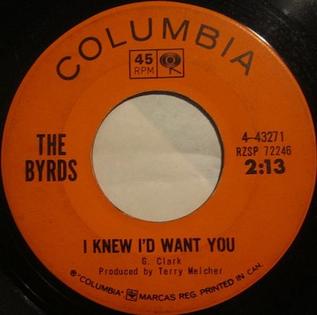
"I Knew I'd Want You" is a song by the folk rock band the Byrds, written by band member Gene Clark, and first released as the B-side to their 1965 debut single, "Mr. Tambourine Man". It was also later included on their debut album, Mr. Tambourine Man.

"How Sweet It Is (To Be Loved by You)" is a song recorded by American soul singer Marvin Gaye from his fifth studio album of the same name (1965). It was written in 1964 by the Motown songwriting team of Holland–Dozier–Holland, and produced by Brian Holland and Lamont Dozier. The song title was inspired by one of the actor and comedian Jackie Gleason's signature phrases, "How Sweet It Is!"
"If You're Gone" is a song written by Gene Clark that was first released on the Byrds' 1965 album Turn! Turn! Turn!.
"The Old Laughing Lady" is a song written by Neil Young that was first released on his 1968 debut solo album Neil Young.

"Everybody Knows This Is Nowhere" is a song written by Neil Young that was originally released as the title track of his 1969 album with Crazy Horse, Everybody Knows This Is Nowhere. The song was written earlier, and a different version was originally considered for Young's 1968 solo debut album Neil Young.
"Tonight's the Night" is a song written by Neil Young that was first released on his 1975 album Tonight's the Night. Two versions of the song bookended the album, with one version as the first song, and the other as the last. "Tonight's the Night" has also appeared on some of Young's live and compilation albums.
"Late for the Sky" is a song written by Jackson Browne. It is the opening track and title track from Browne's 1974 album Late for the Sky.
References
- 1 2 3 Bego, Mark (2005). Joni Mitchell. Taylor Trade Publishing. p. 93. ISBN 9781461662020.
- 1 2 3 4 5 Ruhlmann, William. "Jamaica Say You Will". Allmusic. Retrieved 2024-01-12.
- ↑ Vaughan, Andrew (2015). Eagles FAQ. Backbeat. ISBN 9781617136245.
- ↑ Paris, Russ. The Jackson Browne Fans Page, Jackson Browne Audio Interview. Archived 2012-05-02 at the Wayback Machine
- 1 2 Jackson Browne Fans Page Discography. Archived 2012-04-26 at the Wayback Machine
- ↑ The Old Grey Whistle Test Vol. 3 (DVD). BBC Video. 2006.
- ↑ Scoppa, Bud. Rolling Stone, Review of Jackson Browne, March 2, 1972.
- 1 2 3 4 5 Hjort, Christopher (2008). So You Want to Be a Rock 'n' Roll Star. Jawbone Press. pp. 265–266. ISBN 9781906002152.
- ↑ Zimmerman, Lee (October 9, 2018). "Jackson Browne at 70 – Looking Back at Ten Of The Songsmith's Should Have Been Hit Songs". Glide Magazine. Retrieved 2023-01-12.
- 1 2 3 4 5 6 Rogan, Johnny (1997). The Byrds: Timeless Flight Revisited. Rogan House. pp. 325, 331. ISBN 0-95295-401-X.
- 1 2 Greenwald, Matthew. "Jamaica Say You Will". Allmusic. Retrieved 2024-01-12.
- ↑ Anderson, Jason (2022). "Byrdmaniax". The Byrds: The Ultimate Music Guide. NME. p. 77.
- ↑ McArthur, Andy (2023). The Byrds: Every Album, Every Song. Sonicbond. p. 116. ISBN 9781789522808.
- ↑ Leggett, Steve. "Live at Royal Albert Hall 1971". Allmusic. Retrieved 2024-01-13.
- ↑ Ruhlmann, William. "Jamaica Say You Will/Cocker Happy". Allmusic. Retrieved 2024-01-12.